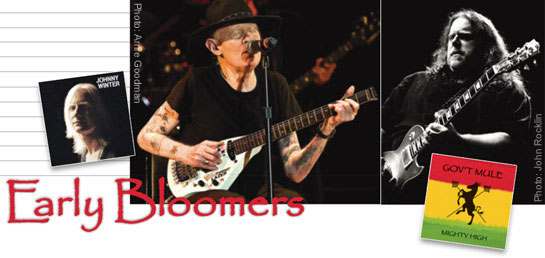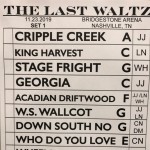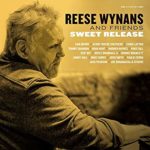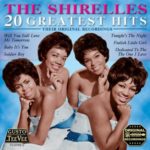
JOHNNY WINTER
Johnny Winter was born February 23, 1944 in Beaumont, TX and discovered a love for the blues and ’50s’ rock ‘n’ roll at a young age. He formed his first band, Johnny and the Jammers, at age 15, with his brother Edgar on piano. Although racial tensions pervaded his hometown, Winter was captivated by the blues scene and frequently visited black neighborhoods to hear and play music. He became a staple at the local blues clubs, and at 17 he shared the stage with B.B. King. When he caught the ear of Rolling Stone in 1968, Winter was officially on his way. He signed with Columbia Records, and the following year his eponymous debut album hit Number 24 on the Billboard Chart.
After two more albums, Second Winter and The Progressive Blues Experiment, Winter went on to form Johnny Winter And with Rick Derringer, Randy Jo Hobbs and Randy Zehringer of the McCoys. Together they released the widely acclaimed Live Johnny Winter And in 1970 and Still Alive and Well in 1973, the latter being Winter’s best-selling album to date. As the decade progressed, Winter’s albums became less like bluesrock and more like just plain blues, and he has been described as the “the unofficial torch-bearer” of that genre. He also served as a producer for Muddy Waters, helping the veteran bluesman reach a wider audience with his work on Grammy-winning Hard Again (1978), I’m Ready (1979) and King Bee (1980).
Winter’s most recent album, the aptly titled, Grammy-nominated I’m a Bluesman, was released in 2004 after a nearly eight-year hiatus, along with a reissue of 1969’s Johnny Winter. In 2005, Johnny and Edgar were inducted into the Southeast Texas “Walk of Fame” for their contributions to the state’s musical history. Winter is currently on tour, and this summer he’ll be appearing both on festival stages and on his own, bearing his blues torch as proudly as ever.
WARREN HAYNES
Born April 6, 1960 in Asheville, North Carolina, Warren Haynes got into music early; fascinated by the strong soul voices of Smokey Robinson, Diana Ross and Otis Redding, he wanted to be a singer. He picked up the guitar at age 12, discovering rock ‘n’ roll in general and Eric Clapton in particular. Through Clapton, he found the blues and became more serious about the guitar. At 14, Haynes began playing gigs around town, and his first band, Ricochet, developed a local following. His big break came in the form of a phone call from David Allan Coe, which resulted in Haynes touring and recording with Coe for four years.
Through Coe, Haynes met Dickey Betts and Gregg Allman. Soon Allman recorded “Just Before the Bullets Fly,” co-written by Haynes, for his album of the same name. Soon after, the Allman Brothers Band reformed, and Haynes was invited to join. The reunion produced two studio albums, two Grammy nominations and a live album. Haynes’ songwriting, singing and playing helped make these albums the Allman Brothers’ most critically acclaimed in years. In 2003 he produced and co-wrote Hittin’ the Note, which many consider to be ABB’s best work since Eat a Peach. Haynes also cut a solo album, Tales of Ordinary Madness, with several Allman-associated session players.
In 1994, Haynes formed Gov’t Mule with bassist Allen Woody and drummer Matt Abts, and in 1997 this band became his main focus. Gov’t Mule released a successful self-titled album in 1995, followed by 1998’s Dose and several live CDs. When Woody died on August 26, 2000, Gov’t Mule paid tribute on their two volume Deep End series, inviting a different renowned bassist to play on each tune. They have since recorded three albums with Andy Hess on bass, most recently 2007’s Mighty High. Warren Haynes co-founded the Mountain Jam festival with WDST Radio Woodstock, and every year he presents his Asheville-based Christmas Jam, benefiting three charities. As a much-sought-after staple of the jam band festival circuit, Gov’t Mule are—what else?—currently on tour.
![]()
Elmore: What are you listening to right now?
Johnny Winter: All kinds of stuff. Watermelon Slim, Ray Charles, Bobby Bland, B.B. King, Little Walter, Derek Trucks, and Magic Slim is great too.
Warren Haynes: There’s always old music for me, whether it’s Otis Redding, Sam Cooke, Bobby “Blue” Bland, Coltrane or Miles, Elmore James, Wolf and Muddy, or Freddie King—all that stuff’s always close by. As far as new music, Ray LaMontagne, Citizen Cope, James Hunter, Medeski Scofield Martin & Wood. I listen to more old music than new, but I’m always looking for good new music.
EM: What was the first record you ever bought?
JW: The first 45 you mean? I’m not real sure, I think it was “16 Tons” by Tennessee Ernie Ford.
WH: A single of James Brown, I think “Mother Popcorn.”
EM: Where do you buy your music?
JW: Off the iPod. I still got a good record collection though.
WH: My wife and I, between us, have thousands and thousands of CDs, some we’ve boughten in stores, these days on Amazon. I prefer Mom and Pop stores, but they’re harder and harder to come by.
EM: What was the first instrument you played?
JW: Clarinet, I was just a little kid, I couldn’t play very good. I was five or six years old.
WH: My brother had an acoustic guitar when I was 11, and I started playing it, and then when I was 12, my dad bought me an electric guitar, a 49-dollar special.
EM: What brought you to the instrument you now play?
JW: I first played ukulele after the clarinet and then the guitar is the natural thing to go for after the ukulele.
WH: I play drums and some bass, but I mostly sing and play guitar.
EM: Who would you like to write with that you haven’t?
JW: I don’t usually write with other people much. I just do it by myself, but I haven’t been writing much lately.
WH: Steve Winwood. There’s a long list, I’m sure. Gregg Allman and I have known each other for almost 30 years, but it’s taken us up until the past six or eight years to be a good co-writing team. It’s been really wonderful.
EM: What musician influenced you most?
JW: Probably T-Bone Walker, everybody’s been influenced by T-Bone.
WH: Probably James Brown in the beginning, who gave me just the general passion and love of music, and taught me what a groove was, what it feels like. Later on, Miles Davis, because every album was different, and he was constantly striving to break new ground and never looked back at what he’d done. It takes a lot of courage to do that, and a lot of us learned a lot from that.
EM: What was the song or event that made you realize you wanted to be in music?
JW: From the movie Pete Kelly’s Blues with Jack Webb, that made me want to be a musician, I was about ten.
WH: When I was about 14, I got a whiff of that. I was going to these singer/songwriter folk clubs and sitting in and thinking, “Oh, I can do this.” But I always wanted that, absolutely, even from the beginning when I was singing at seven in my room. A lot of people have that feeling for a short period of time, and it goes away, and it never went away with me.
EM: Who would you like in your rock and roll heaven band?
JW: Little Walter definitely and T-Bone Walker. Probably my brother on piano, drums I don’t know.
WH: Sam Cooke (vocals), Miles Davis (trumpet), Jimi Hendrix (guitar), John Bonham or maybe Elvin Jones? (drums)… who would play bass? Jaco [Pastorius]! EM: And what would you be doing? WH: Listening! I’d be getting coffee for everybody.
EM: What’s your desert island CD?
JW: Probably The Best of Muddy Waters.
WH: The Willie Dixon box set that has all other artists doing Willie Dixon songs. It’s only two CDs, but it has every great blues artist covering Willie Dixon. I’d hate to be stuck with any genre, though. On a different day, I’d probably choose a Miles Davis record.






[…] We were fortunate enough to speak to Johnny Winter in our Influences feature in 2008. You can read that interview here. […]
[…] encourage all to get out and vote. Everyone from Gregg Allman to Dave Matthews to the Black Keys to Warren Haynes to Moby to John Legend (there are truly too many to name) has been active on social media, sharing […]
[…] up, on December 15, Warren Haynes and company will release Dark Side of the Mule, a set of Pink Floyd covers from a 2008 show. For a […]